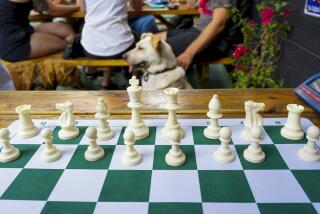Kasparov Defeats Deep Blue in 1st Game
- Share via
Garry Kasparov, the world’s best chess player, defeated the IBM supercomputer Deep Blue in the first game of their $1.1-million chess match Saturday.
Kasparov has claimed that machines will never surpass humans in playing chess, and he took a step toward proving his point by winning in brilliant style against a machine that can examine 200 million positions per second.
Kasparov, playing White, began with a quiet opening. He seemed content to wait for the machine to make unforced errors, and Deep Blue obliged with dubious 11th, 12th and 13th moves.
The critical moment occurred at move 28, when Deep Blue calculated a sequence that left it with a rook against Kasparov’s bishop and pawn. Ordinarily, the rook is stronger, but Kasparov demonstrated that the normal values did not apply in this position. After the exchange of several pieces, Kasparov’s pawns began to advance, and Black resigned.
Before the game, Kasparov complained that he was facing an unknown opponent, as he had not seen any games played by this version of Deep Blue. After his victory, he said, “At least I found some flaws today.”
The game, which lasted three hours and 45 minutes, was played on the 35th floor of the Equitable Building, a Manhattan skyscraper. A crowd of 450 paid $25 apiece to view the action in a first-floor auditorium. Millions more followed the moves over the Internet.
Kasparov and Deep Blue will play five more games. The winner of the six-game series will receive $700,000 of the purse.
Deep Blue is an improved version of the machine that lost, 2-4, to Kasparov in 1996. In that match, Deep Blue won the first game, stunning chess fans. However, Kasparov won three of the remaining games and drew two others.
*
Computer chess has become a testing ground for parallel processing, the computer technique that Deep Blue uses to calculate at phenomenal speeds. C.J. Tan, the leader of the IBM programming team, said: “This is not just a chess match. This is really about the future--how we will be using computers in the future.”
However, chess fans care about wins and losses. Deep Blue and other chess programs measure up very well on that scale, with many triumphs over leading grandmasters. In speed chess (five minutes per game), the machines are almost unbeatable.
Many computer scientists contend that it is just a matter of time before faster and faster machines trounce the world champion. They view chess as a problem that can be solved by mere calculation. Some grandmasters agree, but others argue that calculating ability must be teamed with an intuitive appraisal of each position. Deep Blue, which uses a crude point-count method to judge positions, cannot recognize the exceptional positions where its point-counting gives a misleading assessment.
The second game begins today at noon PDT. Deep Blue will have the advantage of playing White. Here are the moves of Saturday’s game:
1 Nf3 d5 2 g3 Bg4 3 b3 Nd7 4 Bb2 e6 5 Bg2 Ngf6 6 0-0 c6 7 d3 Bd6 8 Nbd2 0-0 9 h3 Bh5 10 e3 h6 11 Qe1 Qa5 12 a3 Bc7 13 Nh4 g5 14 Nhf3 e5 15 e4 Rfe8 16 Nh2 Qb6 17 Qc1 a5 18 Re1 Bd6 19 Ndf1 dxe4 20 dxe4 Bc5 21 Ne3 Rad8 22 Nhf1 g4 23 hxg4 Nxg4 24 f3 Nxe3 25 Nxe3 Be7 26 Kh1 Bg5 27 Re2 a4 28 b4 f5 29 exf5 e4 30 f4 Bxe2 31 fxg5 Ne5 32 g6 Bf3 33 Bc3 Qb5 34 Qf1 Qxf1+ 35 Rxf1 h5 36 Kg1 Kf8 37 Bh3 b5 38 Kf2 Kg7 39 g4 Kh6 40 Rg1 hxg4 41 Bxg4 Bxg4 42 Nxg4+ Nxg4+ 43 Rxg4 Rd5 44 f6 Rd1 45 g7, Black Resigns.
* CHESS COLUMN
Peters’ regular column is on B4.
More to Read
Go beyond the scoreboard
Get the latest on L.A.'s teams in the daily Sports Report newsletter.
You may occasionally receive promotional content from the Los Angeles Times.









